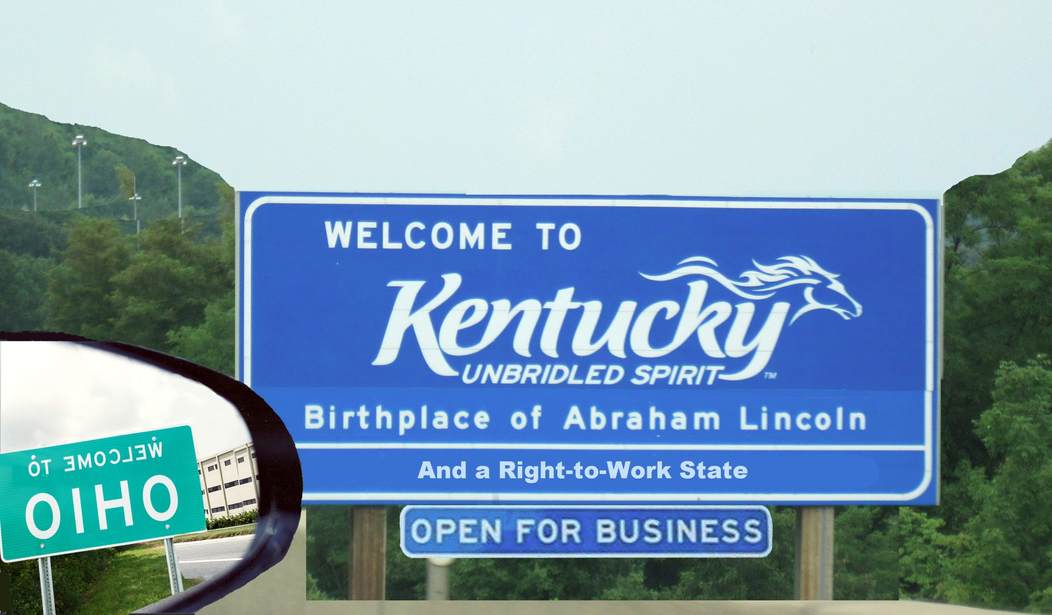Kentucky has become the 27th state to celebrate freedom of choice and create economic growth with the passage of that state’s right-to-work (RTW) law. Although differences exist between states, essentially RTW laws allow workers to opt out of union membership and dues.
Clearly, RTW has national momentum, and on January 7, 2017, Kentucky decided to join the modern growing RTW movement. But this does not bode well for Ohio. Kentucky now becomes the fourth Ohio neighbor that has enacted RTW laws. The other three are Michigan, Indiana, and West Virginia.
The accompanying figure shows how RTW status correlates with how states voted in the 2016 presidential election. A few states stand out, and unfortunately, Ohio is one of them.

As I reported earlier, an Ohio-based free market think tank, Opportunity Ohio, released a report stating,
Since January 2013, Ohio has experienced the 49th best (or 3rd worst) job growth in the country, growing only 0.5 percent adding 22,900 private sector jobs. Since January 2012, Ohio has not fared much better, ranking 45th worst among the states for private sector job growth.
During the campaign to pass the Kentucky law, union members and officials took the position, similar to their counterparts in other RTW states, that RTW laws are meant to hurt unions and workers. However, the data shows otherwise. In the same report, Opportunity Ohio also compared Ohio’s job growth rate to other forced-union states and to right-to-work states, where workers are free to accept or decline union membership.
Over the last 23 years, right-to-work states have grown at a much greater rate than forced unionization states. The average worker freedom state grew 43.3 percent, while the average forced unionization state grew only 16.7 percent. Ohio’s economy only grew a mere 8 percent during this time.
It’s not like there haven’t been attempts to make Ohio a RTW state, it’s just that since a November 2011 ballot referendum that overturned a law restricting collective bargaining rights of public employees, legislative efforts have gained little support. These efforts included laws aimed at both private and public unions.
A good deal of the problem is that Ohio Governor Kasich has shown little interest in pursuing RTW in Ohio since the 2011 referendum defeat. He has repeatedly said right-to-work is not on his agenda nor needed in Ohio, claiming that when he meets with CEOs, no one brings up the right-to-work issue.
Kasich’s statement goes against both common sense and what other business leaders claim. RTW attracts business development because employers know they are less likely to be burdened with costly unnecessary labor contracts in RTW states. As Forbes reports, one president of a site-selection consulting firm claims,
More than half of our companies either make [right-to-work] a threshold or a very important factor in making a decision on where to locate a factory and other operations.
In RTW states, the welcome mat is out front and center. Kentucky chamber of commerce president and CEO Dave Adkisson, said in referring to his state’s RTW law, “This puts a sign on the front door of Kentucky that we’re open for business.”
Recently John Becker, Ohio’s 65th District state representative, satirically expressed his frustration with Ohio’s RTW position:
As an Ohio state representative, I’m incensed by the new legislation signed into law in Kentucky. They have eliminated the prevailing wage, allowing taxpayers to get more for less. They’ll now be able to lower taxes, expand government services to the people, or both. The problem is that this will encourage Ohioans to move to Kentucky.
It gets worse. They also became a right-to-work state by no longer requiring union membership as a condition of employment. This will attract new businesses to Kentucky creating additional jobs, economic activity and a stronger tax base for Kentuckians. The problem is that this will encourage businesses to locate in Kentucky and benefit them rather than Ohio.
My wish is that the Kentucky General Assembly would think about Ohioans before passing laws benefiting their own people.
President-elect Trump has promised he would build a wall along the U.S./Mexican border and make Mexico pay for it. Ohio is rapidly becoming isolated from its neighbors by an economic wall—a wall built by anti-RTW Ohioans and paid for by all Ohioans through restrictions on freedom of choice and subsequent sluggish economic growth.
Sometimes walls come down, as the Berlin Wall did under the leadership of President Reagan. We could ask Governor Kasich, as Reagan asked Gorbachev, “Mr. Kasich, if you seek growth, if you seek prosperity for Ohio, if you seek liberty, come over to our side. Mr. Kasich, support RTW. Mr. Kasich, make Ohio a RTW state!”
However, even though Kasich has warned us of a possible state recession, it’s unlikely he will respond to our request. But there is still hope through other means.
West Chester, an Ohio township north of Cincinnati, may soon become the first place in the state to enact a right-to-work ordinance. Board of Trustees President Mark Welch understands how freedom of choice and economic growth go hand-in-hand:
There is a ton of evidence that says that companies would rather relocate and build their business in Right to Work states. I think we should move ahead on this as quickly as possible and give potential manufacturers that are looking at Ohio or looking at the region, another reason to come to West Chester.
Sometimes, when walls come down, they come down one brick at a time.









Join the conversation as a VIP Member